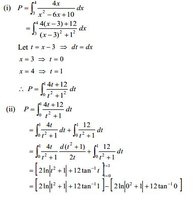You are using an out of date browser. It may not display this or other websites correctly.
You should upgrade or use an alternative browser.
You should upgrade or use an alternative browser.
Definite Integral - 2 questions i need help with
- Thread starter Benji195
- Start date
mmm4444bot
Super Moderator
- Joined
- Oct 6, 2005
- Messages
- 10,962
Hi Benji. What kind of help do you need? Please do us a favor and complete the request to read the forum's guidelines. We would like to know how far you got on each exercise and why you're stuck. Thanks!… questions i need help with …
Guidelines Summary said:… Simply posting an exercise statement without showing work or asking specific questions is not enough for us to help you quickly. As tutors, we need clues about parts you already understand versus what you find confusing, so we can determine where to begin helping you …
\(\;\)
D
Deleted member 4993
Guest
I have several questions about your post:Define Q =[MATH] \int_{5}^{3}\frac{2(X+1)}{X^{2}-6x+13} [/MATH]
1) Rewrite Q into the form of
[MATH] \int_{B}^{A}\frac{MS+C}{S^{2}+K^{2}}[/MATH]
Where a, b, c, k, m are constants
2) Hence, Evaluate Q
- What is the difference between "X" and "x"? You have both in: Define Q =[MATH] \int_{5}^{3}\frac{2(X+1)}{X^{2}-6x+13} [/MATH]
- We are supposed to integrate relative to which variable "dx" or "dX"
If you had shown some work, answers to these questions would have been apparent - and we would start "helpful" helping!
I have several questions about your post:
- What is the difference between "X" and "x"? You have both in: Define Q =[MATH] \int_{5}^{3}\frac{2(X+1)}{X^{2}-6x+13} [/MATH]
- We are supposed to integrate relative to which variable "dx" or "dX"
If you had shown some work, answers to these questions would have been apparent - and we would start "helpful" helping!
Sorry should be
Define Q =[MATH] \int_{5}^{3}\frac{2(x+1)}{x^{2}-6x+13}dx [/MATH]
D
Deleted member 4993
Guest
I need help finding the top section ms+c. Will it be 2(x-3)+4?
Q = [MATH]\int_{3}^{5}\frac{need help}{(x-3)^{2}+4} [/MATH]dx
Would then 2nd answer be which i just need to evaluate?
Q = [MATH]\int_{0}^{2}\frac{t^{2}+4}{t^{2}+4^{2}} [/MATH]dx
According to given hint in OP,
S = ?
K = ?
Define Q =[MATH] \int_{5}^{3}\frac{2(X+1)}{X^{2}-6x+13} [/MATH]
1) Rewrite Q into the form of
[MATH] \int_{B}^{A}\frac{MS+C}{S^{2}+K^{2}}[/MATH]
Where a, b, c, k, m are constants
2) Hence, Evaluate Q
According to given hint in OP,
S = ([MATH]x-3[/MATH])
K = [MATH]4^{2}[/MATH]
?
Steven G
Elite Member
- Joined
- Dec 30, 2014
- Messages
- 14,596
Maybe distribute the 2 in 2(X+1) = 2X+ 2I need help finding the top section ms+c. Will it be 2(x-3)+4?
Q = [MATH]\int_{3}^{5}\frac{need help}{(x-3)^{2}+4} [/MATH]dx
Would then 2nd answer be which i just need to evaluate?
Q = [MATH]\int_{0}^{2}\frac{t^{2}+4}{t^{2}+4^{2}} [/MATH]dx
By the way you do realize that in mathematics that X and x are NOT the same variable?
D
Deleted member 4993
Guest
usingDefine Q =[MATH] \int_{5}^{3}\frac{2(X+1)}{X^{2}-6x+13} [/MATH]
1) Rewrite Q into the form of
[MATH] \int_{B}^{A}\frac{MS+C}{S^{2}+K^{2}}[/MATH]
Where a, b, c, k, m are constants
2) Hence, Evaluate Q
S = x - 3 \(\displaystyle \to \) dS = dx and when x = 5 \(\displaystyle \to \) S = 2 and when x = 3 \(\displaystyle \to \) S = 0
we get M(x-3) + C = 2x + 2
Mx = 2x \(\displaystyle \to \) M = 2, and
-3M + C = 2 \(\displaystyle \to \) C = 8
So now we have,
Q = \(\displaystyle \int_{5}^{3}\frac{2(X+1)}{X^{2}-6x+13} dx \) = \(\displaystyle \int_{2}^{0}\frac{2S + 8}{S^{2} + 2^2} dS\)
=\(\displaystyle \int_{2}^{0}\frac{2S}{S^{2} + 2^2} dS\) + \(\displaystyle \int_{2}^{0}\frac{8}{S^{2} + 2^2} dS\)
Continue.....

